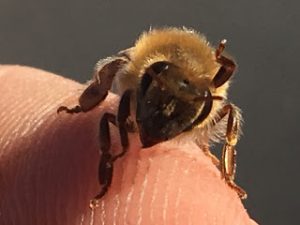Had a comment come in today about challenges our bees are facing and if “man” is the instigator of the challenges we now face?
Well…this is our reply.
The problems we and bees are facing today:
- we have inadvertently permitted the global migration of invasive bee colony pests from around the globe of which the European honey bees have little resistance too.
- we have lowered the life span of the queen from about 5 years to about 1 year in the last 100 years, with most beekeepers unable to rear their own queens.
- we have added complex pesticides and mono crops for bees to feed on found in their primary food sources pollen and nectar. Pollen is used ultimately to produce royal jelly which is used to feed the young larvae and queen.
- we bring millions of honey bees together to pollinate and intermingle and then return them to where they were prior.
- we have little to no information on what supporting organisms existed in hives prior to 100 years ago when utilizing toxic pesticides and herbicides in agriculture began.
- we brought African bees to Brazil to mate with European bees in hopes of producing a better bee but instead inadvertently introduced them to South America. This introduction has led to the spread of Africanized bees throughout South America, Central America and the southern half of the United States.
- we developed a hive (standard boxed hive you see today in fields) that has few similarities in nature and is promoted as the perfect way to care for bees BECAUSE it promotes the most possible return for honey production and ease for migratory beekeeping, not health of the bee.
Of the items listed above, it is hard to imagine how we could turn back time and unevolve the evolution we have participated in. As a result, we have adapted to the challenges by learning more about honey bees we never could have imagined before. Wish we knew 100 years ago what we now know.
As a result we have learned…
-
- some bees exhibit hygienic behavior that aids the bees in defending against predators.
- not all European honey bees are the same, they display many varying traits
- Varroa Destructor (from Asia) and the Small Hive Beetle (from Africa) are only two of the invasive challenges, we are continuing to find others such as the Tracheal Mite.
- genetic development in queen breeding is producing variant bees with additional resistance to current challenges.
- local drones are vital in producing a strong locally adapted queen.
- drones thrive during the day in Drone Congregation Areas.
- a queen is ideally mated with about 15 different drones.
- not all forage is equal. Giving diverse forage for bees aids in stronger colonies – pollen, nectar, propolis, all varies from location to location. Some plants only produce nectar, others pollen, and some produce both.
- bees are sugar scavengers which caused us to restrict open discarding of sugar wastes, labeling them as toxic to the environment.
- migratory beekeepers have learned how to produce countless colonies from their stock each year which resupplies the beekeeping industry with bee packages yearly.
- Africanized bees thrive in warmer climates and have a more frequent swarm cycle than other colonies.
- requeening an Africanized colony with a desirable queen will change the temperament of the colony in 4-6 weeks.
- we have learned that the bee colony / hive is a super organism with many supporting participants. Some are invasive, others are permanent, and others are temporary.
- we have learned how to artificially impregnate a queen with drone semen.
- we have identified countless traits and currently are trying to manipulate DNA to promote health and productiveness of the colony.
- we have seen a decrease of the health of the colony as comb gets darker.
- lessons on queen breeding, splitting a colony, increasing size, over-wintering, feeding, migrating, disease prevention and control, invasive challenges…are all being continuously researched and tested.
- so much more to list…
Please feel free to share with us what you feel we have learned about honey bees in the last 100 years.

